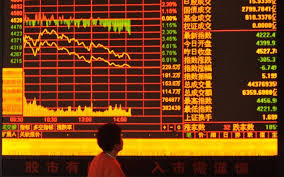China’s stocks fall putting global economy on edge
24 August 2015 by Catherine Holdsworth in Business and finance, Current events, Nine visions of capitalism
This morning the FTSE plunged as the Chinese economy fell, putting investors around the world on a knife edge. Not since 2007 has there been such a drastic drop in global stock prices.
For many years, since the fall of Mao, the Chinese economy has flourished. It has been a great hybrid of ‘capitalism and communism’ as suggested in Charles Hampden-Turner and Fons Trompenaars’ riveting new book, Nine visions of capitalism. Look at the objects on your desk. Many of them will have been made in China. Over the past few decades, labour and manufacturing have been outsourced to China. Why? Well, quite simply, profit margin. For example, it is cheaper to catch fish in the North Atlantic, export it to China to be packaged and then ship it back to Britain than it is to package it in the UK. Clearly this is not an environmentally friendly way to do business, but from a purely capitalist perspective, it is effective.

Why is labour so much cheaper in China? Well, more people are willing to work for lower-paid jobs. With greater competition for jobs, companies can keep wages low. If you don’t want to work for a pitiful pay cheque, then someone else will. Mao’s regime forced millions into dire poverty and some are only now beginning to recover from this. Let’s, for now, put our assumptions about the working conditions aside.
Though definitely not a wholly capitalist country the People’s Republic of China has benefited from Western economic influence. While we outsource labour and other primary services to China, China in turn benefits from what Western capitalism can provide. Capitalism has allowed China to become one of the biggest economies in the world, while still claiming to be outside the capitalist bubble.
So, back to today. Over the past fortnight, the value of the yuan has been depreciating. Since then, trillions of dollars have been wiped from the FTSE. What does this all mean for the future of the economy? Perhaps China’s financial stability was poorer than anticipated. It would seem likely that the cheap labour and services that the West has been benefiting from for many years will now cost more. Trading with China will become a more costly endeavour and this could fundamentally change the face of our manufacturing and primary services.
Once again, our eyes are focused on those on Wall Street who are moving the intricate cogs that support the global economy. To the uninitiated every-person on the street, what goes on is something of a mystery. We are aware of the importance of the FTSE and the NYSE as well as how they have an important effect on the global economy. Like a heart monitor in an intensive care unit, the peaks and troughs of the FTSE index mean little to those who are not trained to recognise what it all means. But we can all imagine that the £91bn that was wiped off the FTSE today is not positive for the global economy.
China is undoubtedly a superpower with great influence. Western domination is being gradually usurped by China’s infiltration of other economies. Like dominoes, when one is affected it runs the risk of knocking down the others. We are making slow but progressive steps out of the recession that began in 2008. The memories, however, are still fresh in the minds of all who were affected, many of whom lost their homes, their jobs and their savings.
However this latest crisis develops the 2008 recession taught a valuable lesson: capitalism affects everyone under its umbrella, and often, it is those that need help most who get hit the worst when times are hard.

